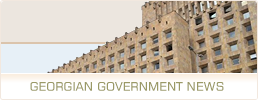25-27 June 2008, Tbilisi, Georgia
Press Release
Senior government officials, non-governmental and business groups from almost 30 countries will meet on 25-27 June 2008 in Tbilisi, Georgia, at the 7th General Meeting of the OECD Anti-Corruption Network for Eastern Europe and Central Asia (ACN) to step up their fight against corruption.
The conference will be held at the Sheraton Metechi Palace in Tbilisi and is open to the media. It will be conducted in English with simultaneous interpretation into Russian and Georgian.
Numerous anti-corruption efforts were made in Eastern Europe and Central Asia over the past few years, but the progress is still limited. While the new EU member states have made some progress, most countries still have a long way to go to ensure sustainability of their anti-corruption work and to implement international standards. The level of corruption in the former Soviet states remains high, and in some countries has even worsened.
During the past few years Georgia has made significant progress in fighting corruption. Holding this international conference in Tbilisi is recognition of the country's efforts. However, much remains to be done and the anti-corruption reform needs to be continued and reinforced.
Political will is indispensible to fight corruption. Access to effective methods to prevent and repress corruption is equally important. In Tbilisi delegates will discuss how to enhance their anti-corruption work in the following areas:
International organisations together with country delegates will talk about the added value of anti-corruption conventions and their monitoring mechanisms to support countries' efforts.
Law-enforcement officials from Azerbaijan, Bulgaria, Romania, Switzerland, the USA and other countries will discuss challenges in investigating and prosecuting complex and high level corruption cases.
Government officials from Estonia, Lithuania, France, Romania, the USA and other countries will examine effective tools to prevent conflict of interests in public administration.
Politicians, journalists and NGOs from several countries will debate how to strengthen support of citizens to anti-corruption reforms.
For the first time business associations and private firms from the OECD and ACN countries will discuss ways to promote business integrity and fight corruption in the region.
The meeting will provide its participants with knowledge about the best and worst practices in the fight against corruption in the region. It is also expected that the delegates from the former Soviet states will agree to continue the monitoring programme under the ACN Istanbul Anti-Corruption Action Plan, which provides peer pressure for the governments to reinforce their anti-corruption reforms.
The meeting is hosted by the Government of Georgia, and is organised by the OECD together with the OSCE, the American Bar Association Rule of Law Initiative Georgia (ABA/ROL Initiative) and the United States Agency for International Development (USAID).
Background information
The Anti-Corruption Network for Eastern Europe and Central Asia (ACN) was established in October 1998. The ACN includes transition economies in Central, Eastern, and South Eastern Europe, Caucasus and Central Asia, as well as OECD member states. International organisations, multilateral development banks (MDBs), donor agencies, civil society and business associations also participate in its activities. The Secretariat of the ACN is based at the OECD. The ACN web site www.oecd.org/corruption/acn provides regularly updated information about its activities.
The main objectives of the ACN is to support its members in their fight against corruption by providing a regional forum for the promotion of anti-corruption activities, exchange of information, elaboration of best practices and donor coordination. The ACN operates through sub-regional initiatives, thematic activities and general meetings.
The Istanbul Anti-Corruption Action Plan is now the main sub-region initiative of the ACN. It was launched in 2003 and involves Armenia, Azerbaijan, Georgia, Kazakhstan, Kyrgyzstan, Russia, Tajikistan and Ukraine. The implementation of the Action Plan has involved reviews of anti-corruption legislation and institutions and adoption of recommendations for each country. This was followed by the first round of monitoring, where progress in implementation of the recommendations was assessed for each country and rated as fully, largely, partially or not implemented. It is expected that the proposal for the second round of monitoring will be discussed and adopted at the 7th ACN General Meeting in Tbilisi, and will be launched at the second half of 2008.
General meetings provide a unique regional multi-stakeholder forum for the transition economies, with flexible structure and high-level political attendance. The 7th General Meeting will pursue the objectives of the ACN: it will review progress achieved by its members in fighting corruption and will provide a forum for the ACN members to exchange experiences and good practices on the key priority areas of fighting corruption in the region.
The special session on the agenda will be dedicated to the recent experience of Georgia in fighting corruption. Meeting of donor representatives will provide an opportunity for bilateral and multilateral assistance agencies and international organisations to share their views on the anti-corruption priorities for the region and planned donor activities. The ACN Steering Group meeting, which will meet back-to-back with the General Meeting, will discuss future activities of the ACN, including Istanbul Anti-Corruption Action Plan. In addition to the official programme, the meeting will provide useful opportunities for informal exchange of information, networking and building contacts.
As in the past, organisers expect some 100 participants from the ACN target countries (Albania, Armenia, Azerbaijan, Belarus, Bosnia and Herzegovina, Bulgaria, Croatia, Estonia, Georgia, Kazakhstan, Kyrgyzstan, Latvia, Lithuania, FYR of Macedonia, Moldova, Montenegro, Romania, Russia, Serbia, Tajikistan, Ukraine, Uzbekistan and Turkmenistan) and several OECD members states and international organisations.










